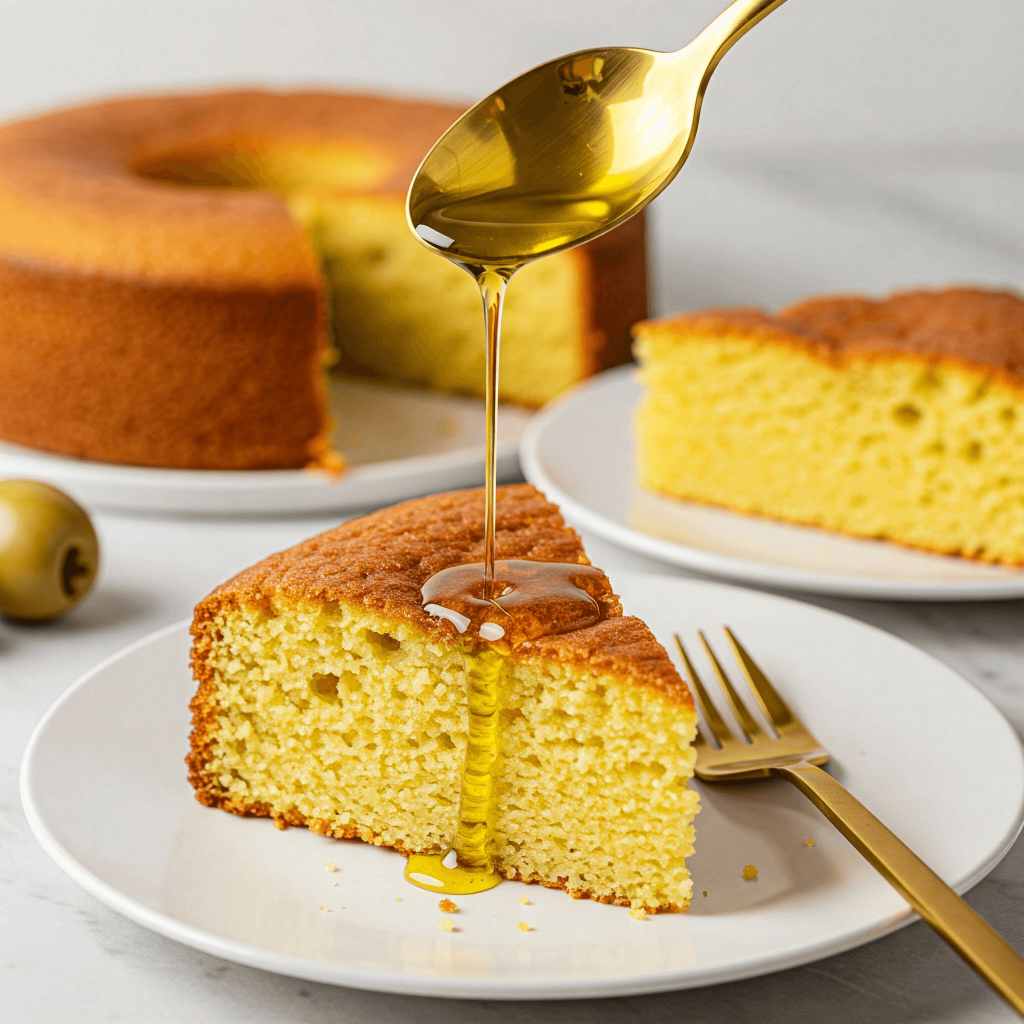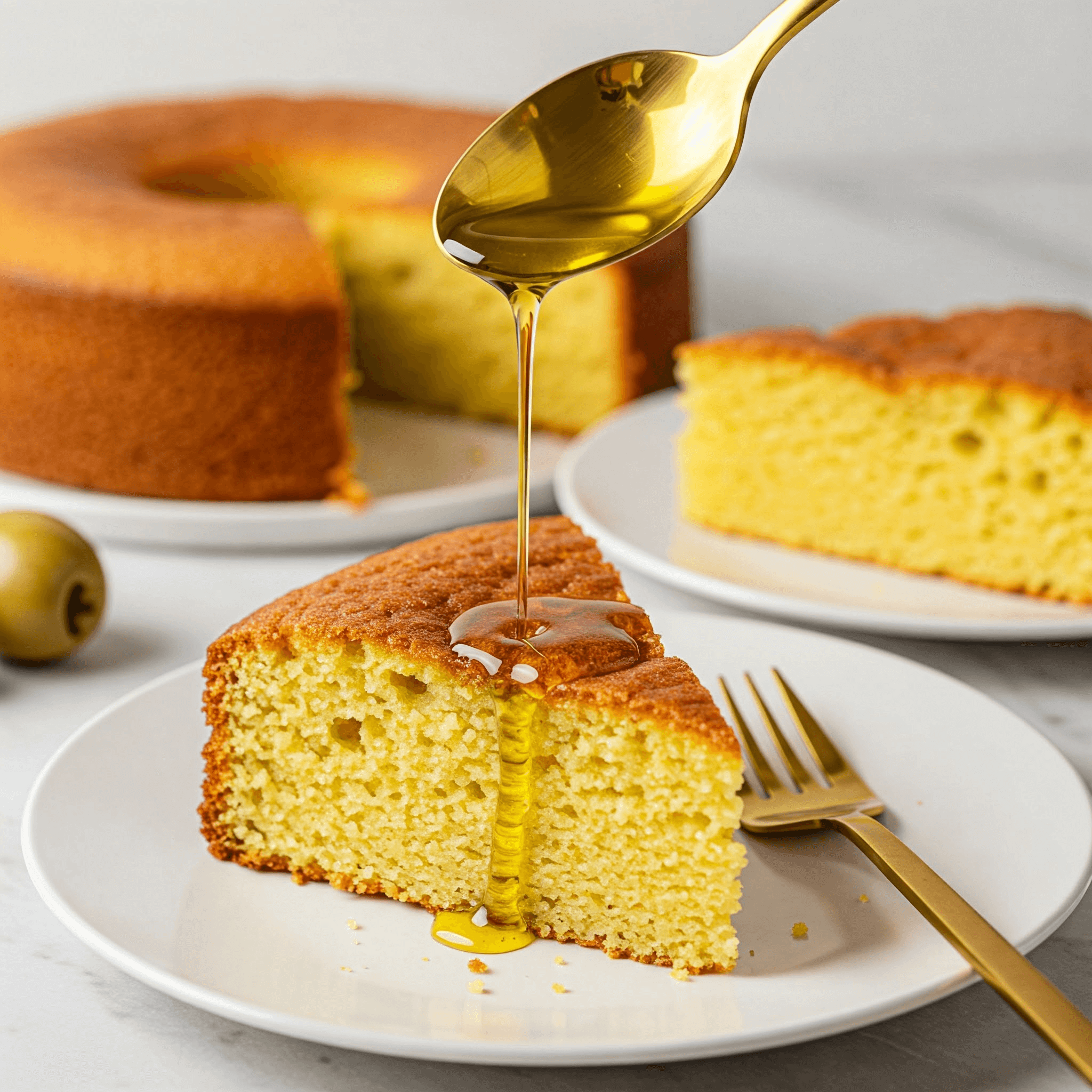I’ll tell you straight — olive oil cake surprised me the first time I made it. I didn’t expect something so simple to taste this good.
You slice through it and the knife glides right down; the crumb is soft, moist, and almost melts on the tongue. It’s rich, but not in a heavy, stick-to-your-mouth way.
It’s the kind of cake that lets the olive oil do the talking — gentle, smooth, with just a touch of fruitiness that lingers in a really satisfying way.
I like that it doesn’t need frosting or fancy fillings. Just a golden, crackly top and a drizzle of honey if you feel like it.
I’ve baked a lot of cakes over the years, but this one always gets quiet nods at the table. It’s the cake I make when I want something that feels thoughtful without fuss.
Olive Oil Cake Recipe
Ingredients (for one 9-inch Bundt or round cake)
- 250 mL (1 cup + 2 tablespoons) extra virgin olive oil (fruity, mild variety)
- 250 g (1 ¼ cups) granulated sugar
- 3 large eggs (room temperature)
- 180 mL (¾ cup) whole milk (room temperature)
- 1 tablespoon freshly grated lemon zest (from about 2 lemons)
- 2 tablespoons freshly squeezed lemon juice
- 1 teaspoon pure vanilla extract
- 250 g (2 cups) all-purpose flour (sifted, spooned and leveled)
- 2 teaspoons baking powder
- ½ teaspoon baking soda
- ½ teaspoon fine sea salt
For Serving (optional but recommended)
- Mild honey, for drizzling
Instructions
- Preheat the oven to 175°C (350°F). Lightly grease a 9-inch Bundt or round cake pan with olive oil and dust with flour, tapping out any excess. Set aside.
- In a large mixing bowl, whisk together the olive oil and sugar until the mixture looks pale and well combined (about 1-2 minutes). Add the eggs one at a time, whisking well after each addition until the mixture thickens slightly and becomes glossy.
- Stir in the milk, lemon zest, lemon juice, and vanilla extract. Mix gently until smooth — don’t worry if it looks slightly curdled; it will smooth out when the dry ingredients are added.
- Over a medium bowl, sift together the flour, baking powder, baking soda, and salt. This ensures the cake’s crumb is light and even.
- Gradually add the dry ingredients to the wet mixture in 2-3 additions. Use a rubber spatula or wooden spoon to fold gently until no streaks of flour remain. Do not overmix — stop as soon as the batter is smooth.
- Pour the batter evenly into the prepared pan. Smooth the top with a spatula. Bake in the center of the oven for 40 to 45 minutes or until the top is deeply golden, a toothpick inserted into the center comes out clean, and the edges have slightly pulled away from the pan.
- Let the cake cool in the pan on a wire rack for exactly 15 minutes. Then carefully invert it onto the rack and let it cool completely.
- Slice and drizzle generously with honey just before serving, exactly like in the image. Optionally, a few green olives or lemon zest curls can be placed on the side for an aesthetic finish.

How Do I Keep Olive Oil Cake Moist?
Simple steps make sure your cake stays soft for days.
- Use enough olive oil: Don’t cut the oil too much.
- Don’t overbake: Bake just until a toothpick comes out clean.
- Store well: Wrap tightly in plastic wrap or airtight container.
- Add honey drizzle before serving: Adds moisture and shine.
Can I Use Regular Olive Oil Instead Of Extra Virgin In Olive Oil Cake?
Yes, you can — but it affects the taste slightly.
- Extra virgin olive oil: Gives a stronger, fruitier flavor and deeper color.
- Regular/light olive oil: Gives a milder flavor and softer aroma.
Why Use Olive Oil In Cake Instead Of Butter?
Olive oil gives a few clear benefits over butter.
- Stays moist longer: Olive oil keeps the cake soft even after a few days.
- Easier to mix: You don’t need to melt it like butter.
- Softer crumb: It makes the cake texture more tender.
- Healthier fat: Olive oil has natural fats that are softer on the stomach.
Is Olive Oil Cake Healthy?
It is healthier than many butter-based cakes when used in the right way.
- Contains healthy fats: Olive oil has unsaturated fats.
- Less saturated fat: No heavy butter or margarine.
- Uses simple ingredients: No heavy creams or artificial flavors.
Which Olive Oil Is Best For Baking Olive Oil Cake?
The best choice is a mild, fruity olive oil that won’t overpower the cake.
- Arbequina: Soft and fruity
- Koroneiki: Balanced and smooth
- Hojiblanca: Mild with a light floral note
- Frantoio: Gentle and nutty
Does Olive Oil Cake Need To Be Refrigerated?
Usually no — but it depends on how long you plan to keep it.
- Eat within 2 days: Keep at room temperature in an airtight container.
- Storing for 3 to 5 days: Wrap well and refrigerate.
- Bring to room temperature before serving: It tastes best soft and not cold.

What Type Of Pan Is Best For Olive Oil Cake?
The pan shape affects how the cake bakes and looks.
- 9-inch round cake pan: Even bake, easy to slice.
- Bundt pan: Creates a beautiful shape and crisp edges.
- Loaf pan: Good for small servings or gifting.
- Springform pan: Easy to release without breaking the cake.
Can I Make Olive Oil Cake Ahead Of Time?
Yes — it actually tastes better after resting.
- Bake 1 day before: The flavor deepens overnight.
- Store wrapped at room temperature: Keeps it soft.
- Drizzle honey or dust sugar before serving: Refreshes the look and taste.
Can I Make Olive Oil Cake Without Eggs?
Yes — but you need a good replacement for structure and moisture.
- Yogurt (¼ cup per egg): Adds moisture and softness.
- Applesauce (¼ cup per egg): Keeps the crumb moist.
- Mashed bananas (¼ cup per egg): Gives a mild sweetness and softness.
- Vinegar + baking soda (1 tbsp vinegar + 1 tsp baking soda per egg): Helps it rise.
Why Is My Olive Oil Cake Dense?
A few common things cause this problem.
- Too much flour: Always measure flour carefully using spoon and level method.
- Overmixing the batter: Mix just until combined.
- Cold wet ingredients: Room temperature ingredients mix better.
- Expired baking powder: Check freshness for proper rise.
Why Is My Olive Oil Cake Bitter?
Bitterness can come from a few small mistakes.
- Using very strong olive oil: Choose a mild or fruity oil.
- Too much lemon zest: Only use the yellow part, not the white pith.
- Overbaking: Can cause a bitter crust.
Can I Make Olive Oil Cake Vegan?
Yes — it’s easy to adapt with plant-based swaps.
- Replace eggs: Use applesauce, mashed bananas, or non-dairy yogurt.
- Use non-dairy milk: Almond milk, oat milk, or soy milk work well.
- Check sugar source: Use pure cane sugar.
How Do I Make Olive Oil Cake More Fluffy?
These tips help get more rise and lightness.
- Use fresh baking powder and baking soda: Old ones won’t rise well.
- Sift flour well: Adds air to the batter.
- Don’t overmix: Keeps the batter light.
- Use room temperature ingredients: Helps the batter mix evenly.
Can I Freeze Olive Oil Cake?
Yes — it freezes very well if done properly.
- Cool the cake fully: Wrap in plastic wrap and foil.
- Freeze up to 3 months: Label with date.
- Thaw at room temperature: Unwrap and let it sit for a few hours before serving.
Can I Use Almond Flour Or Gluten-Free Flour In Olive Oil Cake?
Yes — but the texture will change slightly.
- Almond flour: Gives a moist, dense texture and nutty flavor.
- Gluten-free all-purpose blend: Works best when mixed with a binding agent like xanthan gum.
- Replace only part of the flour: Use half almond flour and half regular flour for balance.

